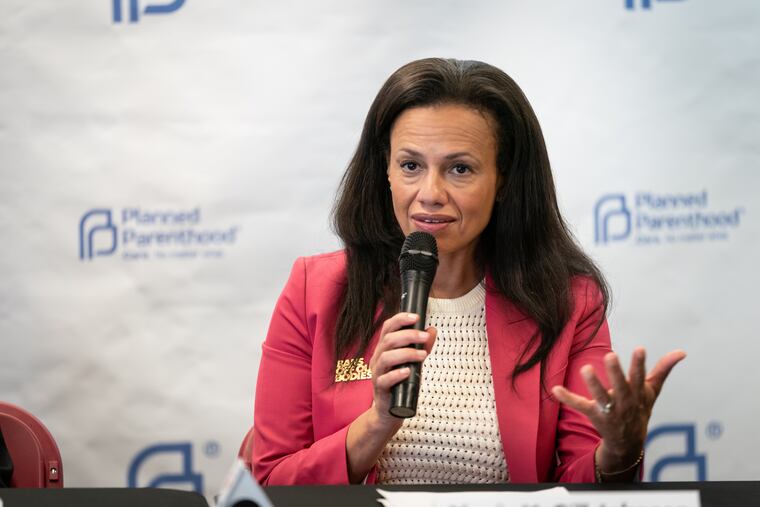Planned Parenthood’s national and Pennsylvania executives gather in Philly to talk about abortion access
Planned Parenthood's national top executive, joined by Pennsylvania affiliates, spoke about the challenge of accommodating an influx of out-of-state patients and preserving access in the Commonwealth.

As a battleground political state sitting at the crossroads of abortion access nationally, Pennsylvania is critical to preserving abortion in America, Planned Parenthood’s top executive said Monday during a roundtable discussion in Philadelphia with regional affiliates of her organization.
Alexis McGill Johnson, CEO of Planned Parenthood Federation of America, was joined by Planned Parenthood executives from Philadelphia, eastern Pennsylvania, and Pittsburgh, who spoke about the challenge of accommodating an influx of out-of-state patients since the U.S. Supreme Court ruled this summer that abortion rights are not protected by the Constitution.
The high court left the decision about when and if people can access abortion to states; 16 states have already banned or severely restricted access, and more are expected to.
“We’re at the beginning of a decades-long battle to restore our rights,” McGill Johnson said.
» READ MORE: Inside Planned Parenthood: The organization known for abortion spends most of its time on other services
Pennsylvania, where abortion is legal through the 23rd week of pregnancy, is considered an “access state.” It is one of a dwindling number nationally where abortion care remains available. Abortion is also legal in neighboring New Jersey, New York, Delaware, and Maryland.
Pennsylvania is the closest point of access for people in Midwestern and Western states where abortion has been restricted. Providers in Pennsylvania estimate they could see a 25% increase in out-of-state patients — some 8,500 additional people.
Yet with just 17 providers — none in the large swath between Pittsburgh and Harrisburg — Pennsylvania is “hardly an access state,” said Sydney Etheredge, CEO of Planned Parenthood Western Pennsylvania, which operates one of two freestanding abortion clinics in Pittsburgh.
Strict requirements for patients and providers make abortion access challenging, despite being legal: Patients must submit to mandatory counseling, a 24-hour waiting period, and laboratory work that providers say is not medically necessary before getting an abortion. Minors must notify their guardians.
“But here we are, fighting for our rights,” Etheredge said. “We know we have to step up.”
» READ MORE: Outside Philly and Pittsburgh, it can be as hard to get an abortion in Pa. as in Mississippi
In fall elections, Pa. is a battleground
Adding to the urgency providers here feel is a sense that Pennsylvania has become a key battleground for abortion rights during a contentious election season.
The governor’s election could determine the future of abortion rights in Pennsylvania: Republican candidate Doug Mastriano, a state legislator, has said he would support a total ban on abortion, without exception for rape or incest. The Democrat running for governor, Attorney General Josh Shapiro, has vowed to protect abortion rights. And the outcome of the race for a U.S. Senate seat here could shift the power of Congress, with implications for a push by Democrats to codify abortion rights.
McGill Johnson’s roundtable in Philadelphia culminated her appearances at a series of Democratic political events in recent days. She stumped with Senate candidate Lt. Gov. John Fetterman at a rally on Sunday, and on Monday afternoon, she hosted a fund-raiser for his campaign along with his wife, Gisele Barreto Fetterman.
Barreto Fetterman volunteered as a clinic escort for Planned Parenthood while in college. At the rally on Sunday she reflected on growing up in Brazil, where abortion was largely illegal and hundreds of women died of at-home operations, telling the crowd: “We will not let that happen here.”
Dayle Steinberg, CEO of Planned Parenthood Southeastern Pennsylvania, which operates clinics in Philadelphia and the surrounding counties, said she is particularly concerned about an effort by Republican lawmakers to amend the state constitution to state that there is no right to abortion in Pennsylvania, a move they say would give the legislature — not courts — the authority to make future decisions. The constitutional amendment, which could be put to a ballot vote as early as spring 2023, would not immediately ban abortion, but could set the stage for a future ban.
“Pennsylvania is safe for now,” said Steinberg, who echoed her colleagues’ calls for people to vote and support candidates who have vowed to protect abortion rights. “The stakes have never been higher.”
Inquirer staff reporter Julia Terruso contributed to this article.